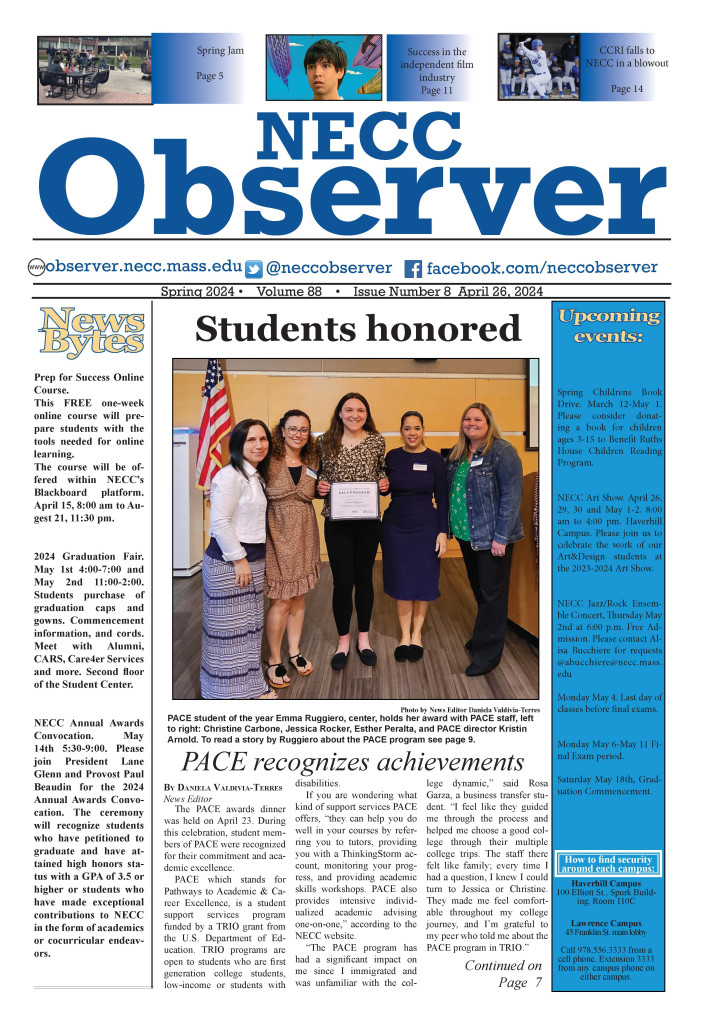A year into the coronavirus pandemic many individuals are still facing significant struggles.
The pandemic has had a huge impact on the way college students learn, forcing them to transition from a traditional in-person learning style to a virtual method of learning through a computer screen with limited interaction.
This “new normal” is especially difficult for students with disabilities, who rely on outside interactions and structured routines to help with their overall development.
NECC student, Garrett Henningsen, says that virtual learning comes with positive and negative factors. Henningsen says his routine has remained very structured throughout the pandemic because he is still taking courses. Henningsen explained that he is only taking one course this semester and finds his workload to be less stressful compared to last semester when he was taking three courses and found his workload to be more overwhelming. Even with a manageable workload, he finds it draining to stare at a computer screen all day long.
Although he can tolerate the virtual learning, he would prefer to be on campus interacting with other students. He is also looking forward to taking advantage of the many amenities on campus including the bookstore and the outdoor running track.
He is not interacting with friends the same way he often would before the pandemic. The summer before the pandemic he often would meet up with friends to hang out and have fun, something he is looking forward to doing again when it is safe.
Henningsen struggles with keeping himself motivated throughout the week, often finding it difficult to complete assignments on his computer.
Despite the many challenges Henningsen is facing, he has a very optimistic outlook about the near future: “We are all going to get through this” and “It will get better soon,” he explains.
For Henry Nachamie, this new way of learning has had a negative impact on his mental health in a variety of ways.
“It’s made me more stressed overall,” he explains.
For Nachamie, one of the most stressful parts is the lack of overall communication when completing assignments online. In some cases, it can be easier communicating with an instructor about something in person, as opposed to via email where it may be more difficult to ask for clarification.
Nachamie feels he has limited interaction with classmates while working from a computer screen. However, Nachamie is thankful for the discussion board assignments and Zoom sessions where students and instructors can engage in some conversation.
In addition, Nachamie expressed that he continuously struggles in terms of keeping himself motivated while working from home because of the many distractions around him. He also feels that using the computer throughout the entire day impacts his productivity, as he often finds himself getting sidetracked by other things on it.
Despite these challenges, Nachamie offers some great advice for others who may be struggling with the same things, “Make sure to take care of yourself” and “Treat yourself kindly.”
James Keith, says that virtual learning can be stressful at times but also manageable as well.
Like Henningsen, Keith stated that his routine is very structured because he has meetings twice a week for a work program he participates in, and completes coursework throughout the week for NECC, both virtual of course.
Like Nachamie and Henningsen, Keith struggles to motivate himself to get assignments done because he is working from home.
Since Keith is assigned work for both his program and his college course, he can easily become stressed over the amount of work he is responsible for.
“Looking ahead at coursework is draining mentally and physically,” he says.
Although sometimes this can impact his schedule, he is usually able to complete his work while leaving plenty of time for leisure activities like going out with family.
“Prioritizing your time is very important,” he says.
Once it became clear the virus was going to be around for some time, he knew the college was going to have to transition to a virtual learning format. Keith was not thrilled about the thought at the time. However, after adjusting to it, he has realized it is not as bad as he first thought.
He would now be open to a hybrid learning format once the pandemic is over.
Although he has adjusted well to the “new normal”, he is looking forward to being back on campus and interacting with other students.

